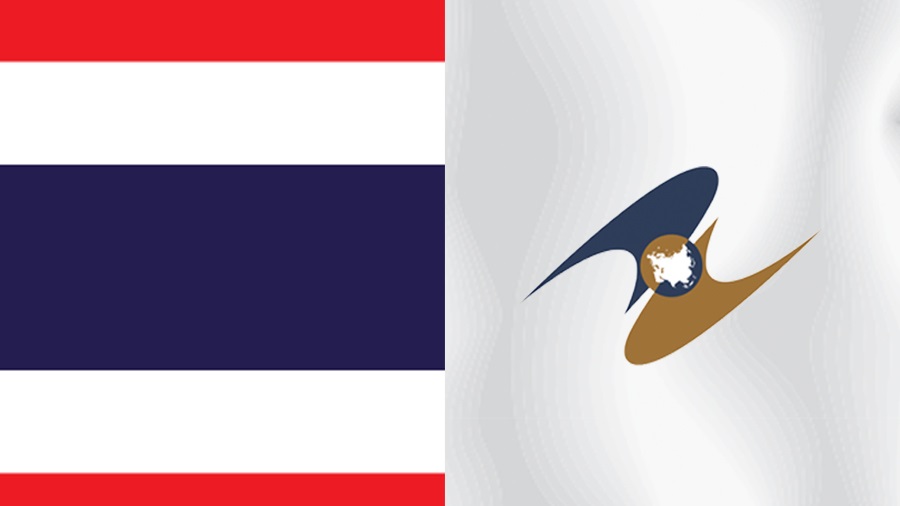Eurasian Economic Union and Thailand Upgrade Trade Ties

In a further example of the growing influence and trade importance of the Moscow-backed Eurasian Economic Union (EAEU) towards Asia and China’s Belt and Road plans, the EAEU and Thailand have signed a memorandum on cooperation and expansion of comprehensive collaboration. EAEU Minister of Integration and Macroeconomics Tatyana Valovaya and Thailand’s Minister of Commerce Sontirat Sontijirawong signed the document on Monday.
The Eurasian Economic Union (EAEU) comprises Armenia, Belarus, Kazakhstan, Kyrgyzstan, and Russia. It is becoming increasingly important as a free trade bloc as it geographically sits between China and the European Union, and is consequently, a major player in the Belt and Road Initiative. Members of the EAEU enjoy tax free status in trade in goods, and are in the process of unifying their complete tax codes, making it easier to transfer goods between them. This has special relevance along the Belt and Road and the transportation of goods traveling west from China and vice versa. It is also seen to boost intra-EAEU trade, with this increasing by 38 percent last year. Collectively, EAEU trade is currently worth some US$2.2 trillion.
“The document signed today with the Kingdom of Thailand enables us to delve into all issues of economic cooperation that the Commission is interested in as a supra-national regulator, our business that is developing cooperation with partners in the region, hold seminars and conferences using the instruments of Thailand’s government, (as well as) establish contacts with those enterprises and organizations that are interesting for our businesses, and foster a direct dialogue with them,” Chairman of the Board of the Eurasian Economic Commission (EEC) Tigran Sargsyan said, adding that he considers the signing to be “the first important step for deepening the cooperation.”
According to Sargsyan, it will only be possible to answer the question whether it is reasonable to shift to the second stage, “meaning the formation of a free trade zone,” after all particular cooperation areas are specified. “That is the first stage of deepening the trade and economic relationship, which allows to reveal particular areas and interests both from the side of Thailand and from the side of our countries’ businesses,” he noted.
“The experience shows that the negotiations process with one country can usually last for two and more years since there are many sensitive fields and there is a necessity to coordinate the positions of five countries inside the European Economic Union (EAEU), which is why that is a labor-intensive work,” the chairman said. “With Thailand, we are doing the first steps now, tomorrow the first forum will be held, which will be attended by Thailand’s businessmen as well. For us it is important to receive requests from them regarding which areas they would like to establish a close cooperation in, and understand their ambitions,” he emphasized.
According to Sargsyan, currently “there is a global economic trend toward Asia.” “That is due to the fact that today Asia is the main driver of the global economic growth. Clearly all countries are striving to establish trade and economic relations with the Asian region so that they could have an opportunity to stimulate economic growth in their countries,” he explained.
The memorandum signed on Monday stipulates that cooperation between EEC and Thailand is aimed at boosting mutual trade and investments, implementing measures to eliminate barriers that hinder the development of trade and attraction of investments, as well as for a closer collaboration in the areas of mutual interest.
The sides plan to cooperate in the following fields: regional economic integration, trade policy, analysis of economic development and macroeconomic situation in the EAEU member-states and Thailand, customs regulation, technical regulation, sanitary, veterinary-sanitary and quarantine phytosanitary measures, finances, transport, energy policy, agricultural sector, competition policy and antitrust regulation, industry, intellectual property, consumer rights protection, information and communications technologies and digital economy, services trade and investments, promotion of entrepreneurship, public procurements, as well as other areas of mutual economic interest. The cooperation envisioned by the memorandum will fall within the framework of the joint working group on cooperation between EEC and Thailand’s government, which will have meetings at the level of co-chairs at least once a year.
The agreement can be seen as a precursor to Thailand developing a full Free Trade Agreement with the EAEU in a few years time. Vietnam, a fellow ASEAN member alongside Thailand, signed off on such a deal two years ago, resulting in significant investment and increase in trade, especially from Russia. Russian manufacturing businesses have also been investing elsewhere in ASEAN; Kamaz has recently established a production and service facility for its heavy duty trucks in Java.
Chris Devonshire-Ellis of Dezan Shira & Associates comments: “Russia manufacturers and traders have started to use the tax and trade benefits of the EAEU and its various agreements, and are becoming more assertive towards Asia and ASEAN in particular. We can expect to see more Russian components and products coming into the global supply chain via Asia in the future.”
About Us
Silk Road Briefing is produced by Dezan Shira & Associates. The firm assists foreign investors establish operations in Asia, including China, ASEAN and India. The practice maintains a Russia desk and this can be reached at maria.kotova@dezshira.com
 Related Reading:
Related Reading:
![]() Russian Businesses Expanding Into Vietnam & ASEAN Via The Eurasian Economic Union
Russian Businesses Expanding Into Vietnam & ASEAN Via The Eurasian Economic Union
![]() The Eurasian Economic Union – Applicable Double Tax Treaties for Foreign Investors and Traders
The Eurasian Economic Union – Applicable Double Tax Treaties for Foreign Investors and Traders
![]() Eurasian Economic Union Gaining Massive Regional Traction across Europe, Asia, and North Africa
Eurasian Economic Union Gaining Massive Regional Traction across Europe, Asia, and North Africa





